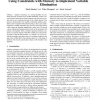Free Online Productivity Tools
i2Speak
i2Symbol
i2OCR
iTex2Img
iWeb2Print
iWeb2Shot
i2Type
iPdf2Split
iPdf2Merge
i2Bopomofo
i2Arabic
i2Style
i2Image
i2PDF
iLatex2Rtf
Sci2ools
107
click to vote
ECAI
2004
Springer
2004
Springer
Using Constraints with Memory to Implement Variable Elimination
Abstract. Adaptive consistency is a solving algorithm for constraint networks. Its basic step is variable elimination: it takes a network as input, and producesan equivalent network with one less variable and one new constraint (the join of the variable bucket). This process is iterated until every variable is eliminated, and then all solutions can be computed without backtracking. A direct, naive implementation of variable elimination may use more space than needed, which renders the algorithm inapplicable in many cases. We present a more sophisticated implementation, based on the projection with memory of constraints. When a variable is projected out from a constraint, we keep the supports which that variable gave to the remaining tuples. Using this data structure, we compute a set of new factorized constraints, equivalent to the new constraint computed as the join of the variable bucket, but using less space for a wide range of problems. We provide experimental evidence of the beneļ...
Artificial Intelligence | ECAI 2004 | Producesan Equivalent Network | Variable Bucket | Variable Elimination |
Related Content
| Added | 01 Jul 2010 |
| Updated | 01 Jul 2010 |
| Type | Conference |
| Year | 2004 |
| Where | ECAI |
| Authors | Martí Sánchez, Pedro Meseguer, Javier Larrosa |
Comments (0)

